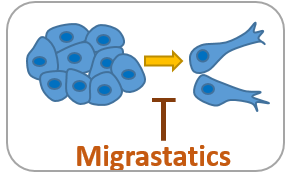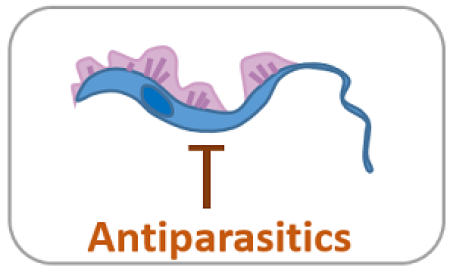Research topics of the group
Migrastatics
Metastasis accounts for more than 90% of cancer-related deaths. Despite recent advances in cancer therapies, the majority of patients with advanced-stage solid tumors die as a result of metastatic disease. Migrastatics represent a new concept of drugs with a great potential to improve the outcome of the current cancer treatment strategies by inhibiting metastatic behavior of cancer cells.
Our goal is to use rational design to synthesize new natural compound analogs with antimetastatic activity. We study structure-activity relationships. Our protein target is actin and actin polymerization regulators, such as the Arp2/3 complex. Antimetastatic activity screening of the new compounds is performed in collaboration with Prof. Jan Brábek group at BIOCEV (Vestec, Czechia).

Projects:
2023-2027: Development of actin polymerization inhibitors as potential migrastatics (GAČR)
2021-2022: Development of actin-targeting compounds with anti-metastatic effect (Dagmar Procházková Fund)
Transcription factor inhibitors
The regulation of cell signaling is one of the most common mechanisms of action for drugs. It is possible to affect cell receptors as well as signal transduction within the cell. Gene expression can also be affected indirectly. However, direct regulation of protein expression by targeting transcription factors is challenging. So far, only a small fraction of them, the so-called nuclear receptors, have been exploited because most transcription factors do not contain binding sites for small molecules.
In our group, we are working on the rational design of inhibitors of other transcription factors involved in metabolic disorders such as diabetes, obesity and infertility. In this project we collaborate within the VSČHT with the groups of prof. Andrea Brancale and Prof. Daniel Svozil.
Projects:
2024-2028: NETPHARM: New technologies for translational research in pharmaceutical sciences (OP JAK)
Antiparasitic compounds
Trypanosomatids are causative agents of several diseases transmitted by insects: Chagas disease (Trypanosoma cruzi), human african trypanosomiasis known as „sleeping sickness“ (Trypanosoma b. gambiense, Trypanosoma b. rhodesiense) and leishmaniasis (Leishmania sp.). The current treatment of these diseases is complicated. Therefore, we study natural compounds, elucidate their mechanism of action and synthesize their analogs for further development as potential drugs. New compounds are developed in collaboration with the group of Prof. Vyacheslav Yurchenko (University of Ostrava).

